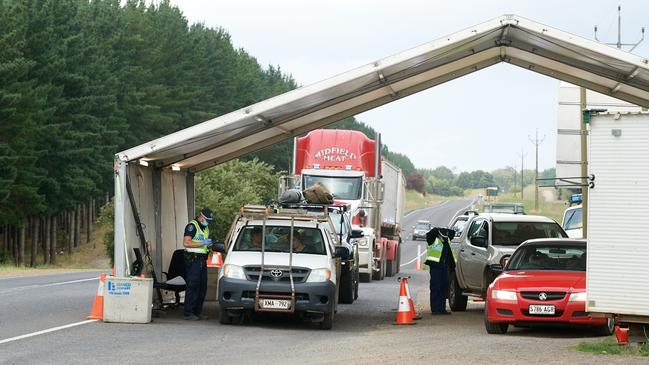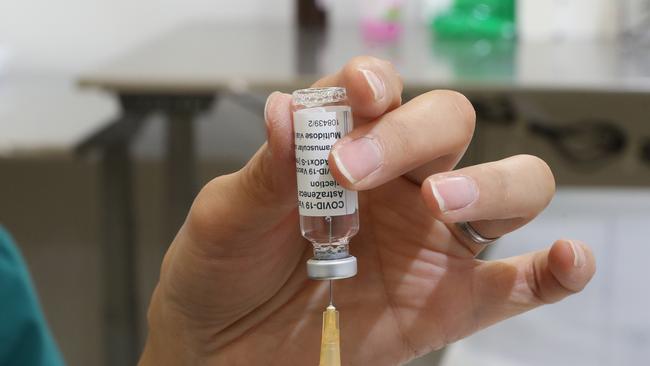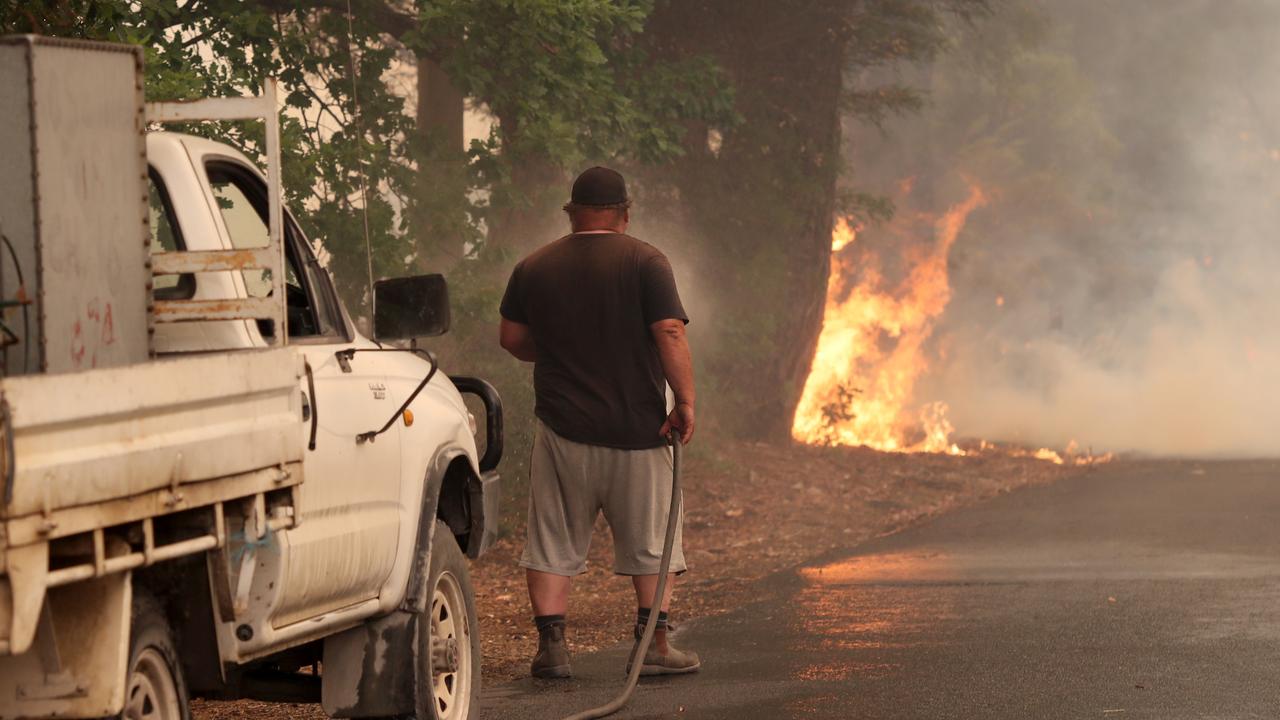Removalists who tested positive to Covid-19 visited petrol stations in SA, deputy chief public health officer says
Authorities are weighing up whether SA petrol stations will be declared exposure sites, after they were visited by a team of removalists who tested positive for Covid-19.

Coronavirus
Don't miss out on the headlines from Coronavirus. Followed categories will be added to My News.
Authorities are working out whether South Australian petrol stations should be declared exposure sites, after they were visited by a team of removalists infected with Covid-19.
One of the three workers was undertaking a job in SA when he was notified he was a close contact of a Sydney case.
SA deputy chief public health officer Dr Emily Kirkpatrick said the trio immediately returned home, stopping at petrol stations along the way.
“We need to then look through that CCTV footage, get a better history around exactly what was occurring,” she told ABC Radio Adelaide on Tuesday.
“We know that people do pull across to the side of the road, some people go into the building, it really depends on what their activity has been.”
She said the man had been asymptomatic when he was notified he was a close contact, and was aware of his requirement not to come into contact with the public. Details of which petrol stations were visited have not been released.

The removalists, who had helped a family relocate from Western Sydney to McLaren Vale, isolated and submitted for testing on their return to New South Wales.
Two of the men have now tested positive to Covid-19, one with the Delta strain. The third returned a negative test result.
Dr Kirkpatrick told FIVEaa said it was likely the two positive cases were infectious while they were in South Australia, and contact tracers were assessing whether there is any risk to the community.
They visited SA on Friday after staying Thursday night in Melbourne, where a number of exposure sites have been declared and an apartment block has been plunged into lockdown.
Victoria’s Covid-19 commander, Jeroen Weimar, revealed his teams had “slightly different messages from the individuals about exactly what they did” in SA as they investigated if they “complied” with restrictions in their essential travel permits.
Health authorities in Victoria said their ongoing interviews were “proving complex and challenging”.
The group’s employer has provided fuel cards and trip logbooks, while contact tracers are using other methods to prove their movements.
SA Police Commissioner Grant Stevens also announced new Sydney travel restrictions amid concerns with the Bondi cluster and flagged new testing requirements on freight or truck drivers from Thursday.
SA clot patient dies
The renewed concern comes amid calls for South Australians vaccinated when eligible, after the state recorded its first death linked to a rare blood clot from the AstraZeneca jab.
Authorities on Monday revealed a woman, 72, had lost her four-day fight for life in the Royal Adelaide Hospital after developing a rare bleeding disorder linked to the AstraZeneca vaccine.
The woman, from an undisclosed regional town, is the fourth Australian to die from complications with thrombosis with thrombocytopenia syndrome (TTS), after receiving the AstraZeneca jab, which is restricted to patients older than 60.
Premier Steven Marshall and Dr Kirkpatrick have urged people to keep getting vaccinated.
Dr Kirkpartick urged hesitant South Australians to look at the problems in NSW and get vaccinated.

“We can almost say the risk is on par with our international arrivals at this point in time, particularly how we’re seeing travellers coming across the border and at least for us here in the state,” she said.
“It is so important to get that Covid-19 vaccine.”
The AstraZenca patient was rushed to the RAH’s intensive care unit on Thursday, a fortnight after she received her first locally administered dose on June 24. She died on Sunday night surrounded by family.
The Therapeutic Goods Administration, which is the nation’s medical regulator, and SA’s Coroner’s Office are investigating.
Officials said her Tier 1 level case involved “clots in an unusual location, such as the brain or abdomen”.
There have been three other such cases in SA – two men, aged 53 and 70, and a woman, 87.
Dr Kirkpatrick said common TTS symptoms included sudden headaches “that don’t go away” with medication such as paracetamol and abdominal or leg pain. Symptoms typically start four or five days after a vaccine and can develop up to 28 days after a first jab.
Medical experts say there is no evidence of problems at this stage with second doses.
Dr Kirkpatrick said while federal advice was to wait three months for a second AstraZeneca dose, SA Health was now looking at a patient’s medical history, background and potential travel if it could be fast-tracked to eight weeks.
“It’s important to know this is a rare condition still (but) that is something that we might continue to see particularly if you’re over the age of 60,” Dr Kirkpatrick said.
“So, it’s important if you’re developing symptoms please go and seek help from your GP. If you’re unable to see your GP and you have symptoms, please go to emergency department. We do know that the TTS is a treatable condition and with early treatment we can try and prevent any long term serious outcomes.
SA Health figures show almost 320,000 SA people have been vaccinated with AstraZeneca, a fifth of whom are fully protected with two doses.
Mr Marshall implored people to get vaccinated to prevent lockdowns and the spread of the particularly dangerous Delta strain that has hospitalised more patients and placed increasing numbers in ICU, including a teen. He warned of a “seriously deteriorating” crisis in NSW.
“We’re encouraging people to get that vaccination. Obviously, this (death) is a very sad situation because, in a very small number of cases, TTS is a side effect of AstraZeneca, mainly with younger people.
“So, we are saying to people that they, if they have concerns, consult their GPs and have that health professional provide … regarding their personal situation.”
SA Health recorded two new cases including a boy aged under 10. He is among 13 infectious children from a total of 20 patients. Two sick men are in the RAH.
Prof Spurrier’s day job goes on
She’s been busy ensuring South Australia is one of the world’s safest places amid the pandemic but Professor Nicola Spurrier has not ignored her other duties.
From dealing with food poisoning outbreaks and mosquito-borne diseases to the challenges of tobacco, alcohol and obesity as well as striving for better health equity, Prof Spurrier and her team have safeguarded and improved the health of South Australians.
As chief public health officer, Prof Spurrier, pictured, has published a report on trends, activities and indicators on health in SA from 2018 to 2020.
The statutory report, published every two years, includes periods of major health crises – the 2019-20 bushfires and arrival of Covid-19.
In addition, the report notes achievements, including:
Full immunisation coverage for 95.5 per cent of Aboriginal children aged 60 months to less than 63 months;
Screening rates for breast, cervical and bowel cancer among the nation’s highest;
Nation-leading uptake of hepatitis C direct-acting antiviral treatment;
Downward trends in smoking rates and a significant decrease in risky alcohol consumption.
“While we can be very proud of these achievements, we still face complex public health challenges,” Prof Spurrier said, identifying tobacco use, overweight, obesity, and dietary risks as leading contributors to the disease burden.
She noted mental illness was now the second largest contributor to years lived in ill-health in SA, and the gap in health outcomes between the least and most disadvantaged communities has widened.
“Intensified climate risk means increased health risk and mortality,” Prof Spurrier warned.
She observed that during a health emergency such as the pandemic, “the benefits of a well-functioning and resourced public health system come to the fore.”
“Public health has shown itself to be the first, second and third line of defence during the Covid-19 pandemic with border quarantine controls to decrease exposure, cross-community education and Covid restrictions to support behaviour change, and testing and contact tracing at the first sign of outbreak,” she said.
The report covers areas from food and water safety and promotion of healthy workplaces and diets through to how SA Health is 3D printing mosquito surveillance traps.
The report lists dementia as the leading cause of death (10.6 per cent) just ahead of heart disease (10.5 per cent).
It shows: 90 per cent of people feel safe in their neighbourhood, 66 per cent volunteer, 15.2 per cent feel socially isolated, 18.4 per cent are aged over 65 and 17.7 per cent under 14,
Life expectancy is 80.4 years (men) and 84.7 (women).


